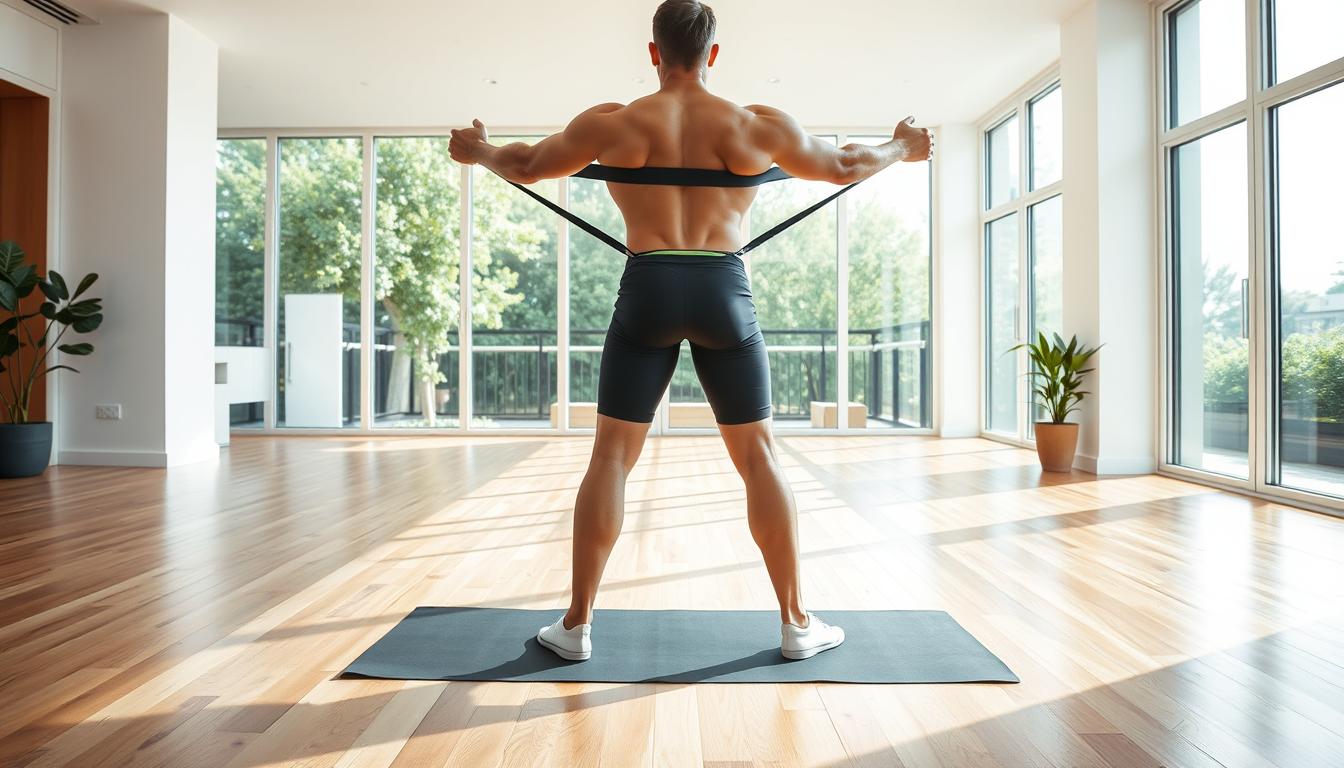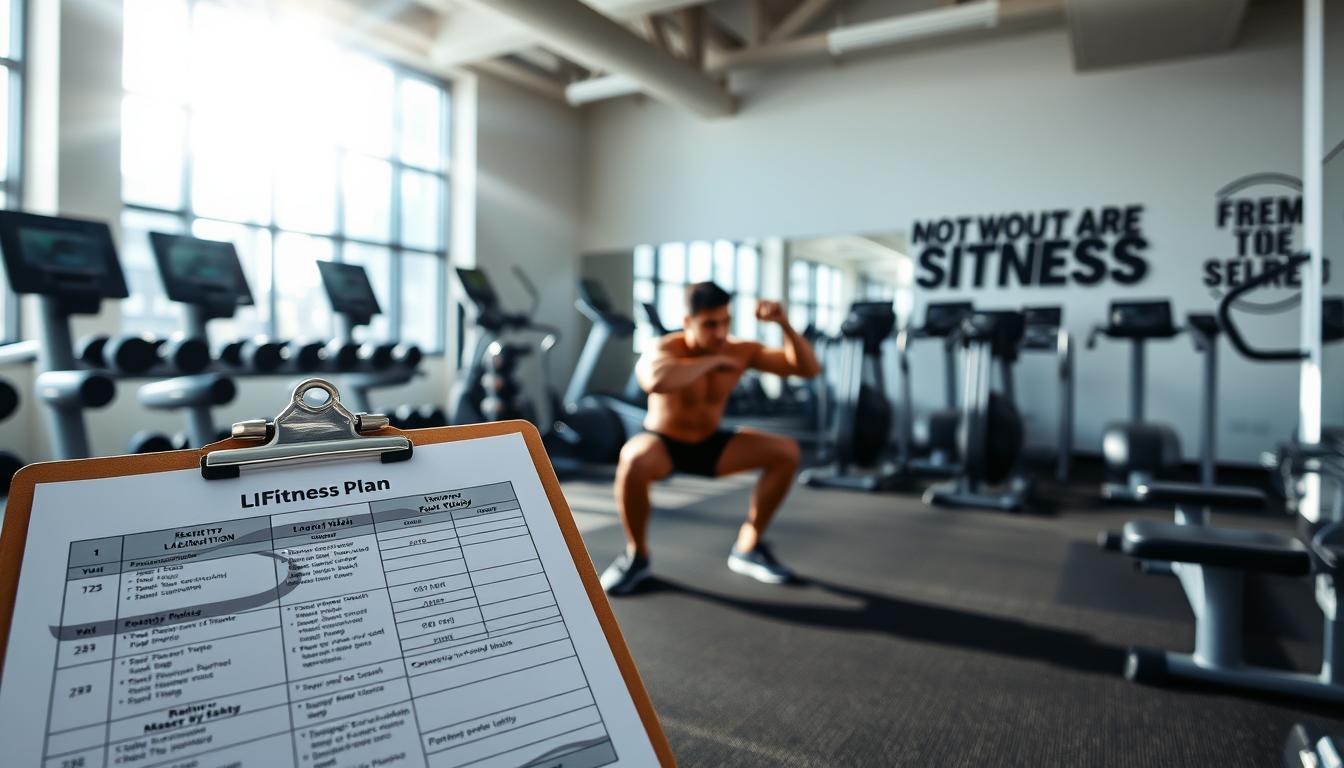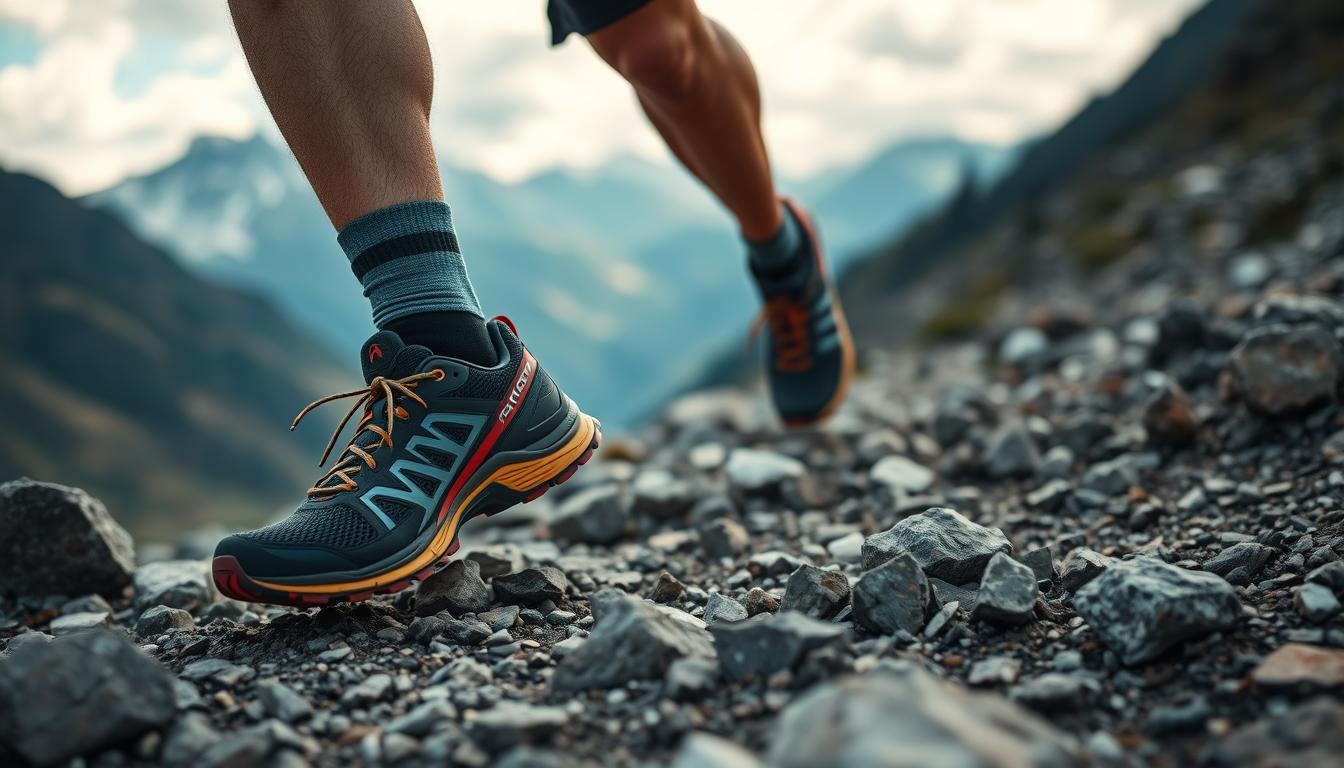Are you tired of your grip holding you back in weight lifting? Do you find it hard to hold onto heavy weights during tough workouts?
You’re not alone. Many athletes face this challenge. It’s not just about having a strong grip. The right equipment makes a big difference. That’s where weight lifting straps come in.
Using the best weight lifting straps can really boost your lifting. They give you the support and grip you need. This lets you focus on your workout, not dropping the weight.
If you’re looking to buy weight lifting straps, picking the right ones is key. The right straps can help you lift more and train harder.
Key Takeaways
- Weight lifting straps can enhance your grip and lifting capabilities.
- The best weight lifting straps provide necessary support and grip security.
- Choosing the right straps is crucial for effective workouts.
- Using straps can help you focus on your training.
- Straps are beneficial for athletes looking to improve their performance.
Understanding Weight Lifting Straps and Their Purpose
Weight lifting straps are great for both new and experienced lifters. They help by giving extra grip support. This lets you focus on the exercise, not your grip.
What Weight Lifting Straps Actually Do
Straps wrap around your wrist and the bar, making a strong connection. They’re especially helpful for deadlifts, rows, and shrugs. These exercises can tire your grip quickly.
Key features of weight lifting straps include their material, width, and how they close. Straps can be made from cotton, nylon, or leather. Each has its own durability and comfort level.
Who Can Benefit from Using Lifting Straps
Lifting straps aren’t just for pros; they help anyone with grip issues. Here are some groups that can really benefit:
- Beginners who struggle with grip strength
- Advanced lifters pushing heavy loads
- Athletes focusing on specific muscle groups
Beginners vs. Advanced Lifters
For beginners, straps build confidence by easing grip worries. They let you focus on form and technique. Advanced lifters use straps to lift heavier, pushing their limits.
Sport-Specific Applications
Each sport and training plan has its own strap needs. Olympic lifters, for example, might look for straps that support and last long. Knowing these needs helps pick the right strap.
Understanding weight lifting straps’ purpose and benefits helps you decide if they’re right for you. They can be a valuable addition to your workout routine.
The Science Behind Grip Enhancement
Grip enhancement is key in weightlifting. Knowing how weight lifting straps work helps you lift better. These straps support your grip, letting you focus on lifting without fear of dropping the weight.
How Straps Improve Mechanical Advantage
Straps give you a mechanical advantage by shifting some of the weight from your grip to your wrists and forearms. This shift lets you lift heavier weights. It boosts your lifting capacity by improving your grip.
The Relationship Between Grip Fatigue and Performance
Grip fatigue limits many lifts, especially heavy ones like deadlifts and rows. Straps reduce grip strain, delaying fatigue. This lets you do more intense sets and possibly lift better.
Research-Backed Benefits
Studies back the benefits of weight lifting straps. They show straps cut down on grip fatigue and boost performance in strength training. Using straps can help you lift more and with more intensity.
Different Types of Weight Lifting Straps
Weight lifting straps come in many types, each with its own benefits. Knowing these differences helps you pick the right one for your needs.
Lasso/Single Loop Straps
Lasso or single loop straps are simple and easy to use. They have a single loop with a strap or Velcro closure.
Design Features
These straps are built for quick adjustments. They’re made from strong materials like nylon or cotton.
Best Applications
Use lasso straps for deadlifts and rows. They’re great for those who get tired of holding the bar.
Figure8 Straps
Figure8 straps have a unique design. They offer extra support and stability for your wrists and hands.
Design Features
The figure-eight design wraps securely around your wrist and the bar. This design is great for heavy deadlifts and pulling exercises.
Best Applications
Figure8 straps are perfect for extra support. They’re best for maximal lifts and exercises that stress your wrists.
Closed Loop/Olympic Straps
Closed loop or Olympic straps have a continuous loop. They’re durable and supportive.
Design Features
These straps are made for heavy-duty use. They’re designed for Olympic lifting and intense exercises.
Best Applications
Use closed loop straps for Olympic lifts and heavy pulling exercises. They offer the support you need.
Hook Grip Straps
Hook grip straps work with the hook grip technique. They provide support and comfort for your hands and wrists.
Design Features
These straps have a special design for the hook grip. They include padding for comfort and grip security.
Best Applications
Hook grip straps are great for deadlifts and exercises using the hook grip. They offer the support you need.
A renowned strength coach says, “The right weight lifting straps can make a big difference.” Choosing the right strap can change your lifting game.
“The right strap can help you lift heavier and train more effectively. But, it’s important to choose one that fits your specific needs and lifting style.”
– Expert Lifter
Key Benefits of Weight Lifting Straps
Weight lifting straps are a valuable tool for lifters. They offer many benefits that can improve your performance. Straps provide extra grip support, letting you focus on your lifts without grip fatigue holding you back.
Breaking Through Plateaus with Increased Load Capacity
One key benefit of weight lifting straps is handling heavier loads. They reduce grip strain, allowing you to lift more. This is important for muscle growth and progressive overload.
Targeting Specific Muscle Groups More Effectively
Straps give you the security to target specific muscle groups better. For example, in deadlifts, your grip won’t hold you back. You can then focus on your back, legs, and glutes.
Extending Your Training Volume
Weight lifting straps also help you train longer. They reduce grip fatigue, letting you do more sets and reps. This can lead to better muscle endurance and strength.
Reducing Callus Formation and Hand Stress
Straps also reduce callus formation and hand stress from heavy lifting. This makes lifting more comfortable and reduces downtime for hand injuries.
| Benefit | Description | Impact on Training |
|---|---|---|
| Increased Load Capacity | Handle heavier weights | Progressive overload and muscle growth |
| Targeted Muscle Groups | Focus on specific muscles | More effective workouts |
| Extended Training Volume | More sets and reps | Greater endurance and strength |
| Reduced Hand Stress | Less callus formation and injury | More comfortable lifting experience |
Potential Drawbacks to Consider
Weight lifting straps have some downsides that lifters should know. Knowing these can help you decide if they’re right for your workouts.
Impact on Natural Grip Strength Development
Using weight lifting straps can affect your grip strength. If you rely too much on straps, your grip might not get as strong as it could.
Dependency Concerns for Competitive Lifters
Competitive lifters might worry about becoming too dependent on straps. Using them too much can hurt your performance in competitions where they’re not allowed.
Situations Where Straps Are Counterproductive
Straps aren’t always the best choice. For example, they can slow down progress in exercises that need a strong grip.
Safety Considerations
Safety is very important. Using straps wrong can cause accidents or injuries. Make sure they’re adjusted right and check them often.
| Drawback | Description | Mitigation Strategy |
|---|---|---|
| Impact on Grip Strength | Reduced need to engage grip | Alternate between strapped and unstrapped lifts |
| Dependency Concerns | Overreliance on straps | Limit strap use to specific exercises or phases |
| Safety Considerations | Risk of accidents or injuries | Ensure proper adjustment and inspection of straps |
Strength training expert says, “The key to getting the most from weight lifting straps is to use them wisely. Make sure they’re part of a balanced workout plan.”
Choosing the Right Weight Lifting Strap Material
When it comes to weight lifting straps, the material is key. It affects both the strap’s durability and how well it performs. Let’s look at the top materials and what they offer.
Neoprene
Neoprene is a favorite among weight lifters. It’s known for its weight lifting strap durability and ability to handle heavy weights. Neoprene straps are also great at reducing hand fatigue during long workouts.
Latex
Latex straps are another popular choice. They’re known for their weight lifting strap material quality and grip. Latex is also very flexible, making it easy to wrap around your hands.
Leather
Leather straps are known for their weight lifting strap durability. They’re strong and can last a long time. Leather straps also provide a good grip, helping you control the weight better.
Mesh
Mesh straps are great for keeping your hands cool. They’re made of breathable material, which helps prevent sweat buildup. This makes them a good choice for those who get sweaty during workouts.
Choosing the right material is important for your lifting performance. Each material has its own benefits. Think about what you need and choose the best one for you.
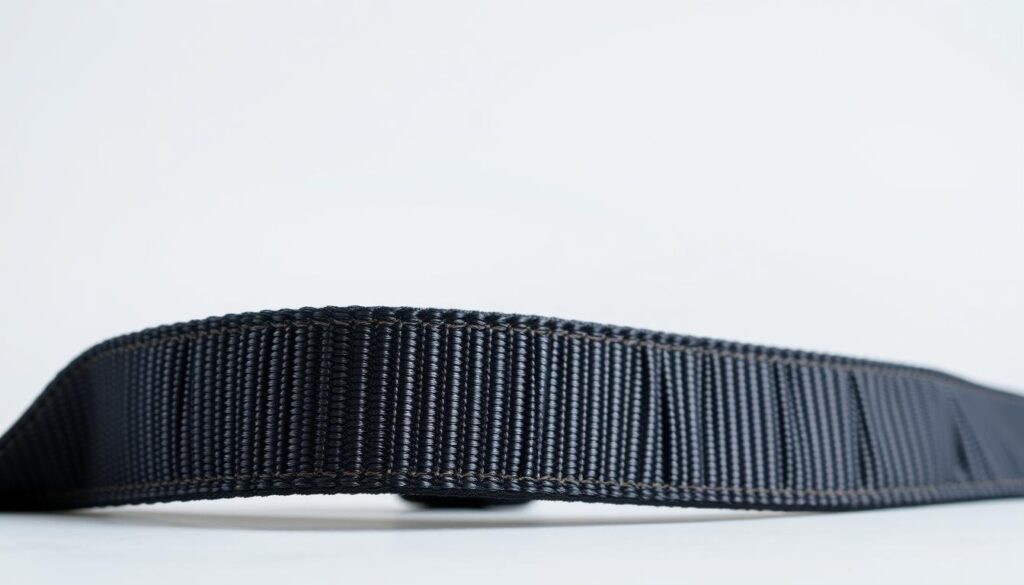
Top 5 Best Weight Lifting Straps of 2023
Take your weight lifting to the next level with the top 5 straps of 2023. These straps are chosen for their quality, performance, and how much users like them. Whether you’re experienced or just starting, the right straps can really help your training.
Rogue Fitness Ohio Lifting Straps
Rogue Fitness Ohio Lifting Straps are a favorite among lifters. They’re known for being tough and comfy.
Key Features and Specifications
- Made from high-quality materials
- Designed for heavy-duty use
- Comfortable and adjustable
Pros and Cons
The pros of Rogue Fitness Ohio Lifting Straps include their durability and comfort. But, some find them too long for smaller hands.
Best For
Rogue Fitness Ohio Lifting Straps are best for heavy-duty lifters. They’re reliable for intense workouts.
Harbinger Padded Cotton Lifting Straps
Harbinger Padded Cotton Lifting Straps give a comfy and secure grip. They’re padded with cotton, perfect for those with sensitive hands.
Key Features and Specifications
- Padded cotton for comfort
- Adjustable design
- Durable construction
Pros and Cons
The pros of Harbinger Padded Cotton Lifting Straps include their comfort and adjustability. But, some say they’re not as durable as others.
Best For
Harbinger Padded Cotton Lifting Straps are best for lifters who prioritize comfort and have sensitive hands.
Gymreapers Lifting Wrist Straps
Gymreapers Lifting Wrist Straps are made for heavy lifting. They offer great support and stability.
Key Features and Specifications
- High-quality materials
- Excellent wrist support
- Adjustable and secure
Pros and Cons
The pros of Gymreapers Lifting Wrist Straps include their excellent wrist support and durability. But, some find them too tight.
Best For
Gymreapers Lifting Wrist Straps are best for heavy lifters. They offer maximum wrist support and stability.
Serious Steel Fitness Figure8 Straps
Serious Steel Fitness Figure8 Straps are versatile and comfy. They’re great for many lifting exercises.
Key Features and Specifications
- Figure8 design for versatility
- Comfortable and adjustable
- Durable construction
Pros and Cons
The pros of Serious Steel Fitness Figure8 Straps include their versatility and comfort. But, they might not work as well for very heavy lifts.
Best For
Serious Steel Fitness Figure8 Straps are best for lifters who need a versatile strap for various exercises.
Grip Power Pads Elite Lifting Straps
Grip Power Pads Elite Lifting Straps have a unique design to enhance grip. They’re great for those who struggle with grip fatigue.
Key Features and Specifications
- Unique grip-enhancing design
- Comfortable and adjustable
- Durable construction
Pros and Cons
The pros of Grip Power Pads Elite Lifting Straps include their grip-enhancing features and comfort. But, some find them too bulky.
Best For
Grip Power Pads Elite Lifting Straps are best for lifters who struggle with grip fatigue and need extra grip support.
Proper Technique: How to Use Weight Lifting Straps
## Proper Technique: How to Use Weight Lifting Straps
Weight lifting straps are great for many lifters. They offer support and help prevent injuries during heavy lifts. To use them right, it’s key.
### Step-by-Step Guide for Lasso Straps
#### Setup Position
To start with lasso straps, know how to set them up. First, wrap the strap around your wrist. Make sure it’s not twisted or tangled. Place it around your wrist, just above the cuff, or a bit above it, based on your preference and the exercise.
#### Wrapping Technique
When wrapping the lasso strap, keep it snug but not too tight. Aim for a comfort level that supports without limiting movement. For most lifts, wrap it to secure a firm grip.
#### Securing the Grip
To keep the grip secure, avoid a strap that’s too loose. It might slip during lifts. Adjust it to keep a firm hold throughout your exercise.
### Technique for Figure8 and Other Strap Types
There are other straps like figure8 and Olympic straps too. Figure8 straps offer extra support, especially for deadlifts and rows. Always follow the manufacturer’s guide for using these straps.
### Common Mistakes and How to Correct Them
A common error is not adjusting straps right for the exercise. Make sure to use the right strap and adjust it correctly. Another mistake is straps that are too tight, which can limit movement and cause injury. Adjust them to a snug but comfortable tightness for support.
By following these tips and using straps correctly, you can enhance your workouts and get the most out of them.
Best Exercises to Pair with Weight Lifting Straps
To get the most out of your weight lifting straps, it’s key to know which exercises they work best with. These straps support your grip during heavy lifts. This lets you focus on the main muscles being worked.
Deadlifts and Variations
Deadlifts are a key exercise in many weight lifting routines. Using straps can help you lift heavier weights. This is because they help with grip strength.
Conventional Deadlifts
Conventional deadlifts work many muscle groups. Straps help keep your grip strong throughout the lift.
Romanian Deadlifts
Romanian deadlifts focus on the hamstrings and glutes. Straps help you focus on these muscles without getting tired from grip.
Trap Bar Deadlifts
Trap bar deadlifts also benefit from straps, especially when lifting heavy.
Row Variations and Pulling Movements
Rows are another exercise where straps are very useful. They help keep your grip strong during pulling movements.
Barbell Rows
Barbell rows target the back and arm muscles. Straps help you do more reps without dropping the barbell due to tired grip.
Dumbbell Rows
Dumbbell rows target individual muscle groups. Straps support your grip, especially with heavier dumbbells.
Cable Rows
Cable rows provide steady tension throughout the exercise. While less likely to need straps, they can be used for heavier weights or more reps.
Shrugs and Trap-Focused Exercises
Shrugs target the trapezius muscles. Using straps can let you lift heavier. This might lead to more muscle growth.
Exercises Where Straps Should Be Avoided
While straps are useful for many exercises, there are times to avoid them. For example, exercises that need grip strength, like farmer’s walks or grip strengthening exercises, are not good for strap use.
| Exercise | Benefit with Straps | Strap Recommendation |
|---|---|---|
| Deadlifts | Increased weight capacity | Highly Recommended |
| Rows | Improved grip endurance | Recommended |
| Shrugs | Heavier loads possible | Recommended |
| Farmer’s Walks | Reduced grip strengthening | Not Recommended |
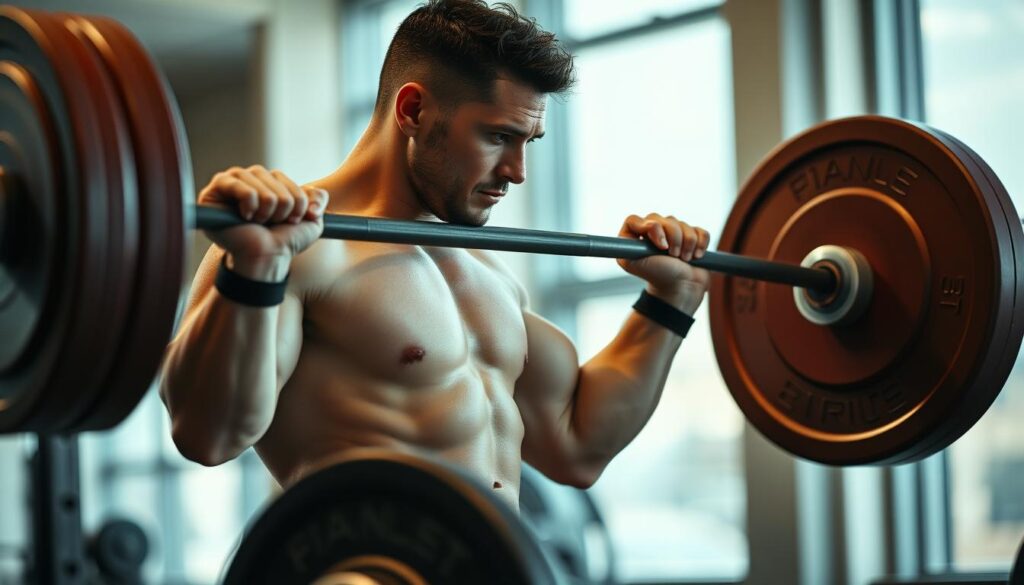
Care and Maintenance of Your Weight Lifting Straps
To get the most out of your weight lifting straps, proper care and maintenance are key. This not only extends their lifespan but also keeps them clean and effective.
Cleaning Methods for Different Materials
Different materials need different cleaning methods. Cotton straps can be machine washed, while nylon or polyester straps might need hand washing. Always check the manufacturer’s instructions for specific guidance.
Storage Best Practices
Store your straps in a dry, cool place. Avoid leaving them in a gym bag for too long, as this can cause moisture buildup and odor. Proper storage is crucial for the durability of your straps.
| Material | Cleaning Method | Storage Tip |
|---|---|---|
| Cotton | Machine Wash | Air Dry |
| Nylon/Polyester | Hand Wash | Hang to Dry |
Signs It’s Time to Replace Your Straps
If your straps show signs of wear, like fraying or loss of elasticity, it’s time for a new pair. Regularly check your straps to keep them in good shape. This supports your lifting performance and safety.
Conclusion: Maximizing Your Lifting Potential with Quality Straps
Having the right equipment is key for weightlifting. This article has highlighted the importance of quality weight lifting straps. They help you lift better and stay safe.
Choosing the right straps is crucial. Whether you’re new or experienced, the right straps can improve your training. They help you grip better, reduce fatigue, and lift heavier weights confidently.
Quality straps can make your workouts better. So, pick the best straps for you. Start lifting bigger with confidence.
FAQ
What are the benefits of using weight lifting straps?
Weight lifting straps offer extra grip support. They help you lift heavier weights without getting tired. This lets you focus more on your workout. They also prevent injuries and boost your performance.
Are weight lifting straps suitable for beginners?
Yes, beginners can benefit from weight lifting straps. They help when you’re still building your grip strength. But, it’s key to learn how to lift correctly first.
What type of weight lifting straps is best for deadlifts?
For deadlifts, lasso or single loop straps are best. They’re simple to use and give a secure grip. This helps you control the lift better.
Can weight lifting straps help with grip strength development?
Weight lifting straps can help with grip support. But, they shouldn’t replace exercises that target your grip and forearms. It’s important to keep working on your grip strength.
How do I choose the right material for my weight lifting straps?
The material you choose depends on your lifting style and preferences. Cotton straps are comfy and breathable. Nylon and leather straps are durable and last longer.
Can I use weight lifting straps for all exercises?
No, you shouldn’t use straps for every exercise. They’re best for heavy lifts like deadlifts, rows, and shrugs. Don’t use them for exercises that need a natural grip, like bicep curls or tricep extensions.
How do I care for and maintain my weight lifting straps?
To keep your straps in good shape, clean them often. Store them in a dry place and avoid extreme temperatures. Check them regularly for wear and tear.
Are there any safety considerations when using weight lifting straps?
Yes, using straps safely is important. Make sure to wrap them correctly around your wrists and the bar. Avoid over-tightening, which can cut off blood flow.


